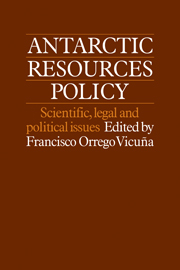Book contents
- Frontmatter
- Contents
- List of contributors
- 1 Antarctic resources policy: an introduction
- Part one The state of Antarctic knowledge and experience
- Part two The policy for the conservation of the living resources of Antarctica
- Part three The policy for the exploration and exploitation of the mineral resources of Antarctica
- Part four Issues on Antarctica and the law of the sea
- 17 The application of the law of the sea to the Antarctic continent
- 18 The application of the law of the sea and the exclusive economic zone to the Antarctic continent
- 19 The continental shelf of Antarctica: legal implications for a regime on mineral resources
- Part five The policy for Antarctic cooperation
19 - The continental shelf of Antarctica: legal implications for a regime on mineral resources
Published online by Cambridge University Press: 06 July 2010
- Frontmatter
- Contents
- List of contributors
- 1 Antarctic resources policy: an introduction
- Part one The state of Antarctic knowledge and experience
- Part two The policy for the conservation of the living resources of Antarctica
- Part three The policy for the exploration and exploitation of the mineral resources of Antarctica
- Part four Issues on Antarctica and the law of the sea
- 17 The application of the law of the sea to the Antarctic continent
- 18 The application of the law of the sea and the exclusive economic zone to the Antarctic continent
- 19 The continental shelf of Antarctica: legal implications for a regime on mineral resources
- Part five The policy for Antarctic cooperation
Summary
This study will deal with the continental shelf as a factor in the discussions and agreements concerning the establishment of a regime for mineral resources. The regime's area of application, which is currently under negotiation by the Consultative Party nations is directly linked to a series of problems which are influenced by: the general principles of the law of the sea which are applicable to Antarctica; the rights and positions of States, both considered individually and as participants in the Antarctic System; the general principles of the Antarctic Treaty – and particularly those which relate to the legal authority of the Consultative Parties, taking into account the practices they have followed; as well as new developments in international law regarding the concept of the common heritage of mankind as it applies to the area of the sea-bed and the ocean floor, and their mineral resources (General Assembly Resolution 2749 and Article 136 of the 1982 Law of the Sea Convention).
Interest in the mineral resources of the continental shelf is particularly based on estimates that hydrocarbon production in that space would be the most likely form of mineral exploitation in Antarctica. Potential resources of the Antarctic continental shelf have a connection with the theory of the break-up of the ‘super-continent’ of Gondwanaland. This had led to speculation as to the presence of sedimentary characteristics similar to those of neighbouring continents and about their hydrocarbon potential.
- Type
- Chapter
- Information
- Antarctic Resources PolicyScientific, Legal and Political Issues, pp. 253 - 264Publisher: Cambridge University PressPrint publication year: 1983
- 1
- Cited by



